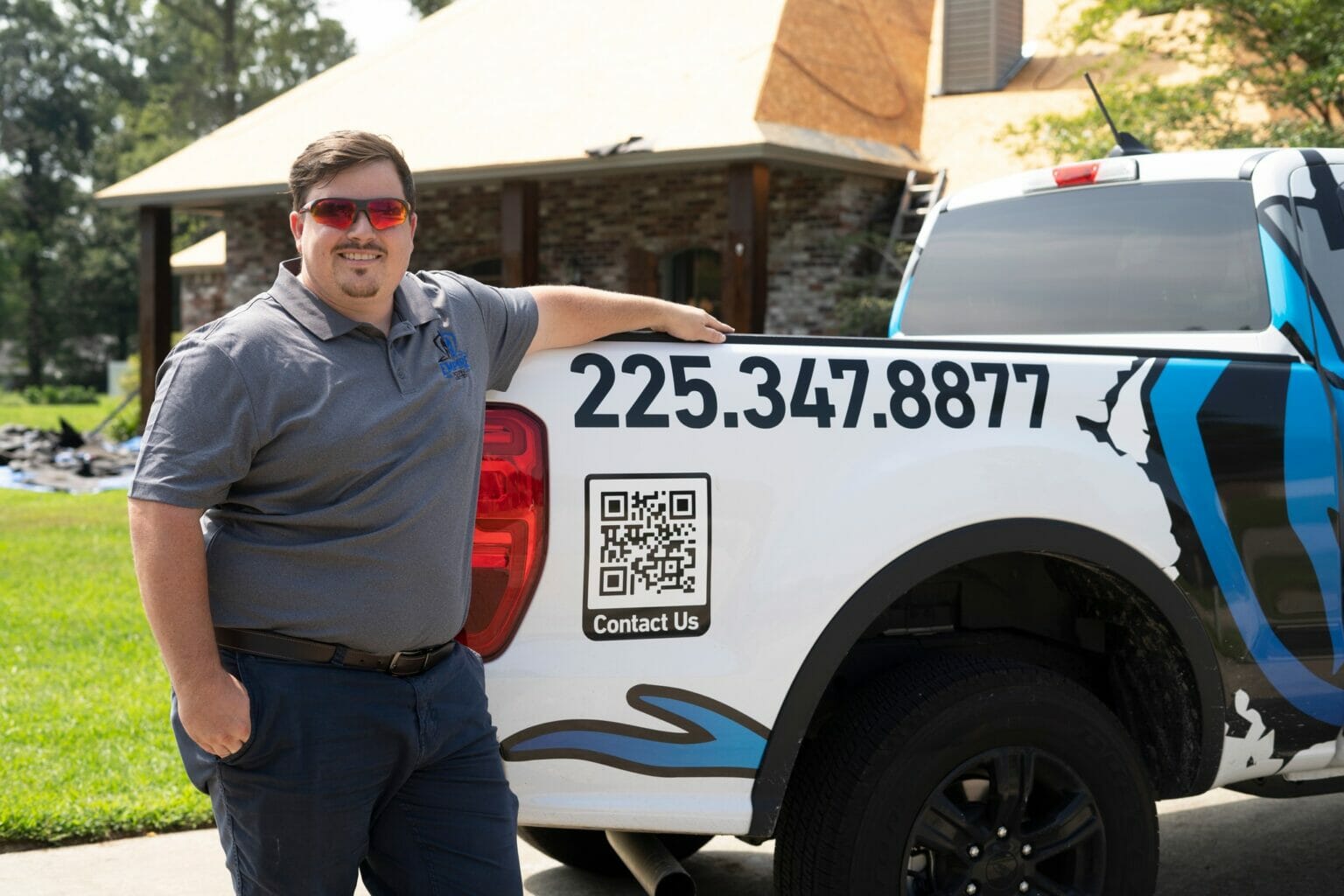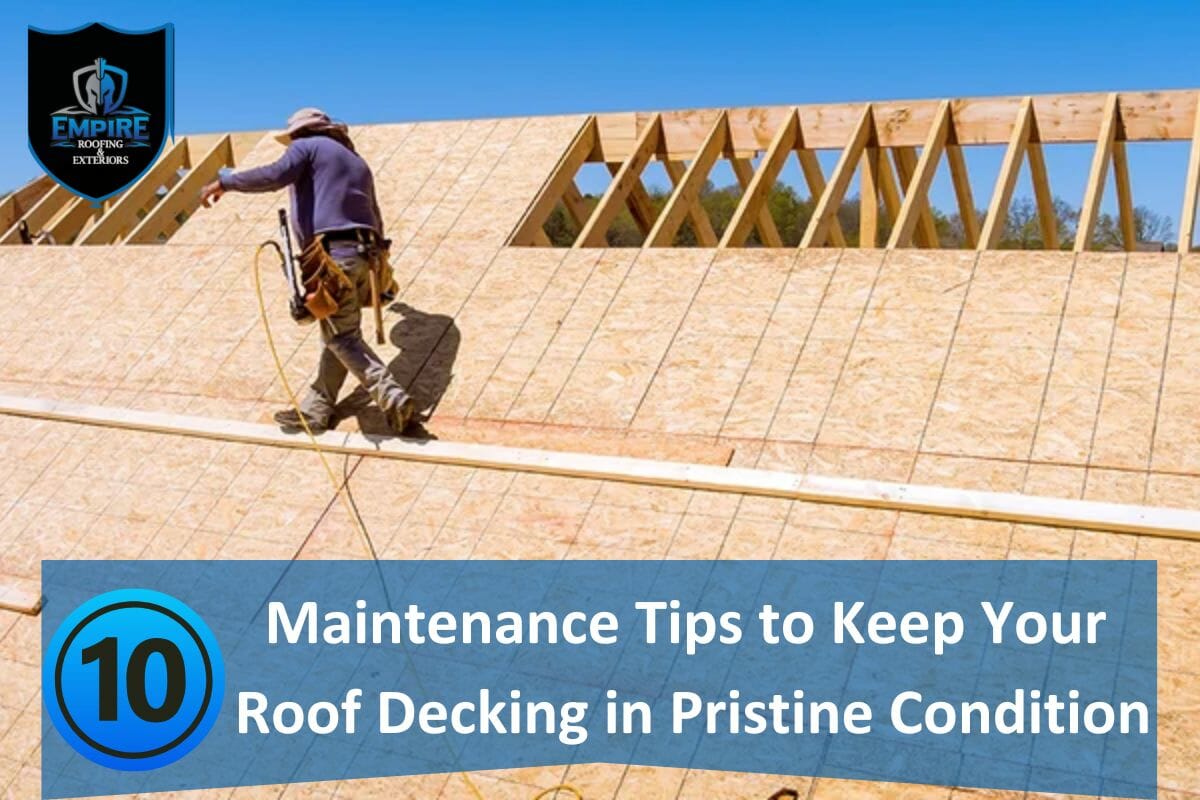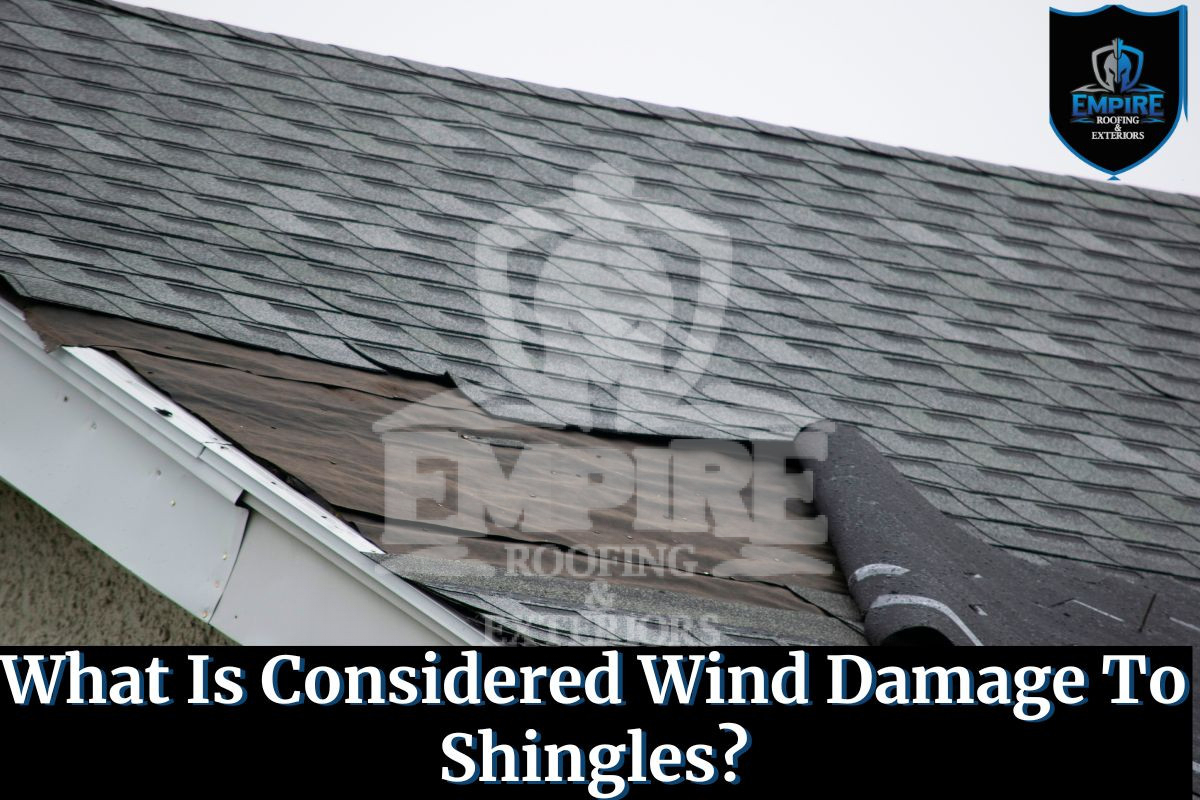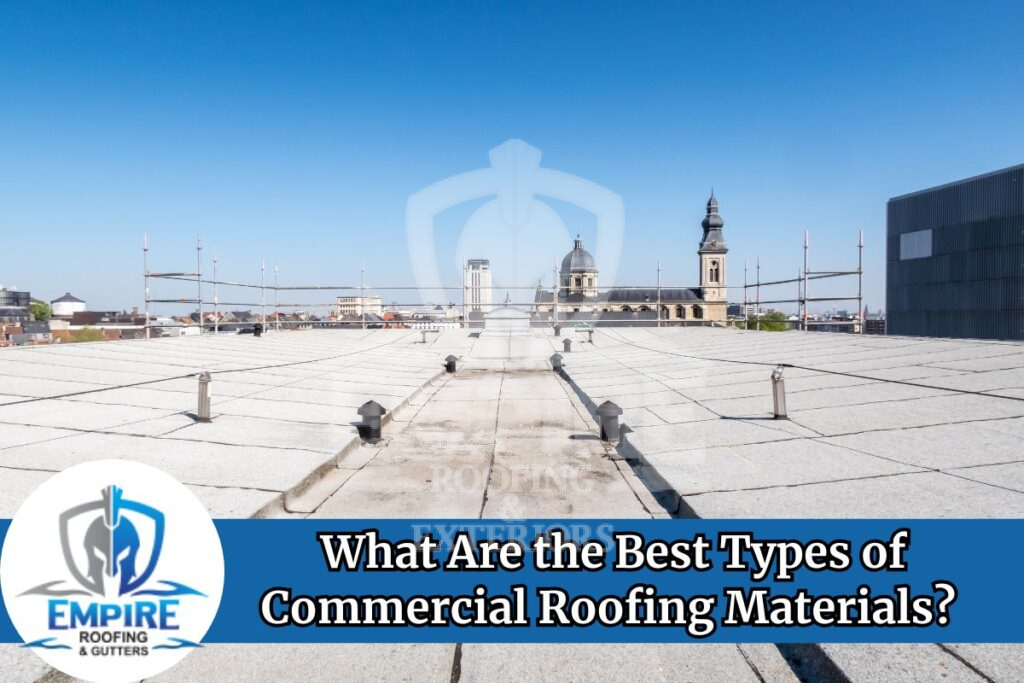
One of the most important choices you will make for protecting your business is the roofing material. The right roofing material affects long-term durability, energy efficiency, and maintenance expenses, in addition to protecting your building from the weather.
In this in-depth blog post, we’ll go over the best commercial roofing materials on the market, helping you choose wisely for your property.
What Are The Best Types Of Commercial Roofing Materials?
Below are some of the best commercial roofing materials to help you make the right decision for your roof.
#1. EPDM (Ethylene Propylene Diene Monomer)
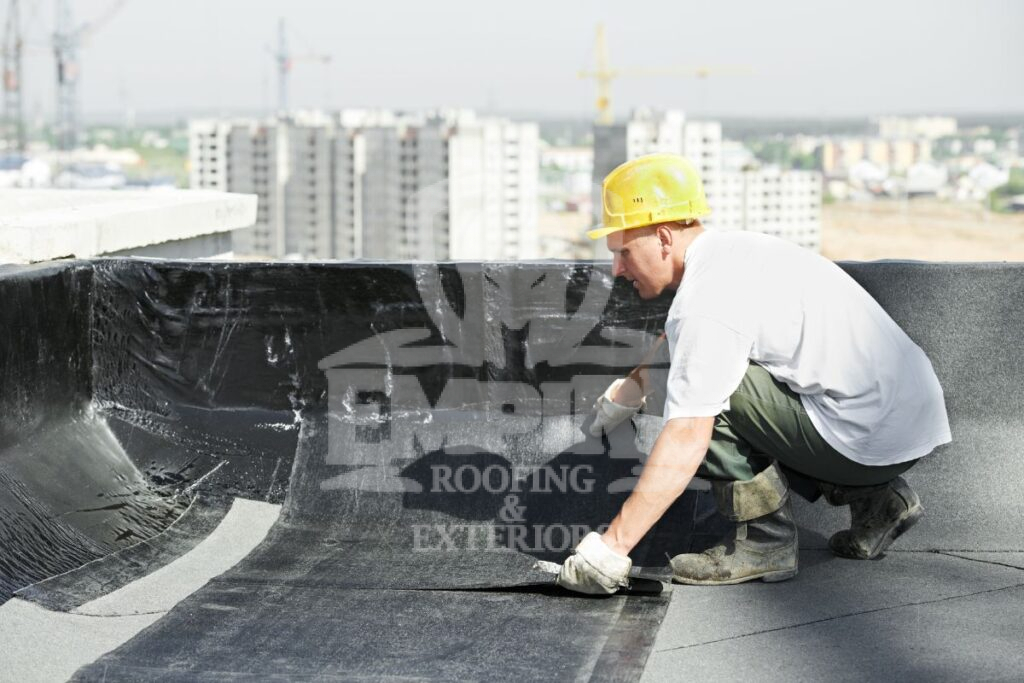
Quite popular for its exceptional performance, EPDM stands out as a top choice for low-slope or commercial flat roof materials. This synthetic rubber membrane is highly resistant to ozone, UV rays, and severe weather, making it a reliable option for various environments. Available in large rolls, EPDM is easy to install with mechanical or adhesive fasteners. Its white and black color options offer energy efficiency, and its durability—often lasting over 20 years—makes it popular for many commercial properties.
| PROS | CONS |
| Cost-effective: Affordable option for commercial roofs. | Aesthetic limitations: The look might not appeal to all. |
| Easy installation: Large sheets make installation simpler. | Puncture risk: Vulnerable to damage from foot traffic or debris. |
| Weather-resistant: Works well against UV rays and extreme weather. | Seam issues: Improperly sealed seams can cause leaks. |
#2. Modified Bitumen
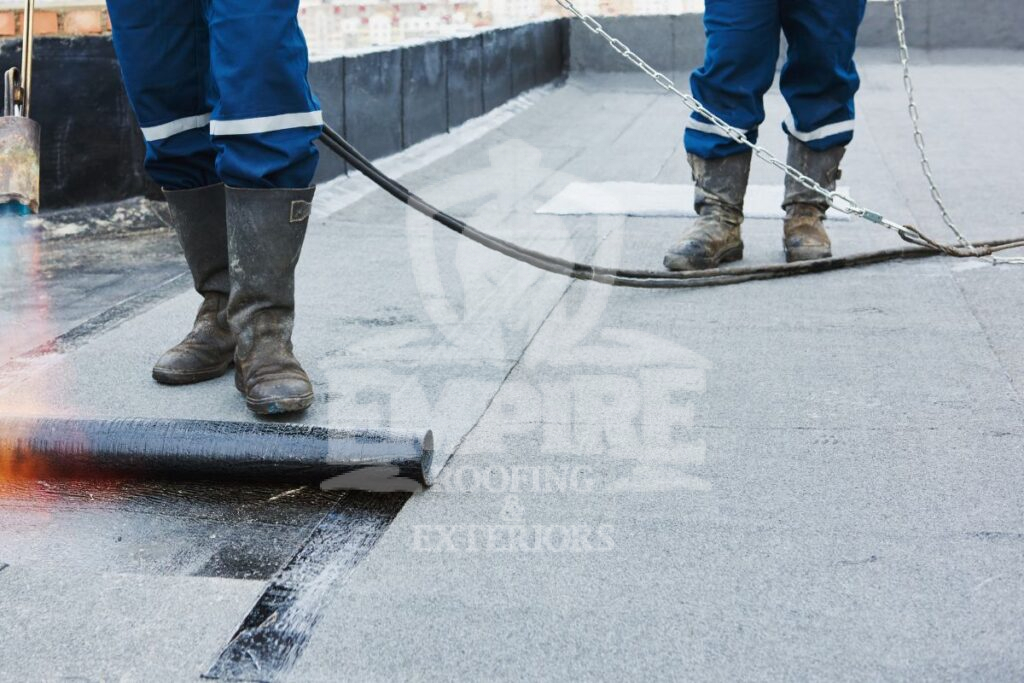
Similarly, modified bitumen is another solid option for low-slope commercial roofs. Made of asphalt-saturated felt reinforced with polyester or fiberglass, modified bitumen offers both strength and flexibility. With various installation methods—including self-adhering sheets, cold adhesive, and torch application—modified bitumen is versatile. Known for excellent leak resistance and durability in harsh conditions, modified bitumen typically lasts between 10 and 20 years, making it a dependable material.
| PROS | CONS |
| Affordable: Lower-cost option for commercial roofs. | Complex installation: Requires skilled labor for proper application. |
| Leak prevention: Effectively prevents water infiltration. | Heat absorption: Dark color may increase energy costs in warm climates. |
| Repairable: Easy to patch if damaged. | Weight: Heavier than some other materials, needing extra support. |
#3. TPO (Thermoplastic Olefin)
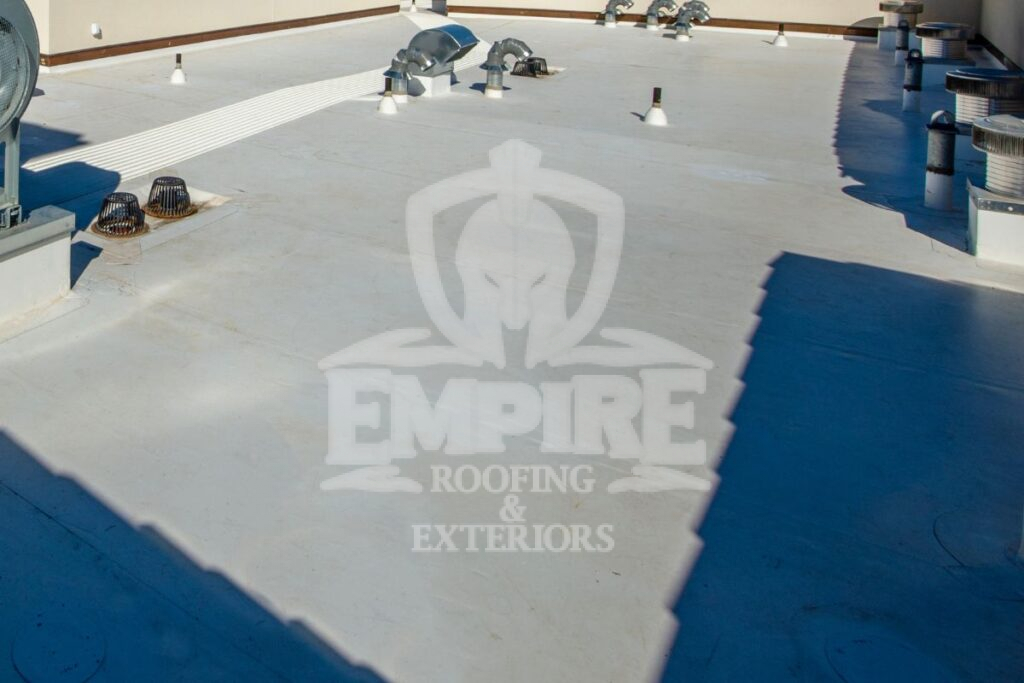
In contrast, TPO is a cost-effective, energy-efficient choice for commercial buildings. This single-ply membrane is composed of a blend of polypropylene and ethylene-propylene rubber, providing strong UV and chemical resistance. Commonly available in white or light colors, TPO reflects sunlight, which helps reduce cooling costs. While lightweight and puncture-resistant, TPO may encounter challenges with seam integrity and typically has a shorter lifespan compared to other roofing options.
| PROS | CONS |
| Durable: Resists tears, punctures, and impact damage. | Seam vulnerability: Poorly welded seams can fail. |
| Easy installation: Lightweight and simple to apply. | Expansion issues: Can contract or expand with temperature changes. |
| Energy-efficient: Reflective surface reduces cooling costs. | Limited color choices: Mainly available in lighter colors. |
#4. PVC (Polyvinyl Chloride)
On the other hand, PVC provides a durable, long-lasting solution for commercial structures. As a thermoplastic membrane, it offers excellent resistance to UV rays, fire, and chemicals. PVC roofs are often light-colored or white, reflecting sunlight to improve energy efficiency and reduce cooling costs. While PVC roofing systems may be more expensive initially than EPDM or TPO, their easy maintenance and repair make them a worthwhile investment over time.
| PROS | CONS |
| Fire-resistant: Enhanced safety against fires. | High initial cost: More expensive than EPDM or TPO. |
| Low maintenance: Easy to repair due to weldable seams. | Cold weather issues: May become brittle in low temperatures. |
| Energy-efficient: Reflective surface reduces cooling costs. | Installation complexity: Requires skilled labor for proper welding. |
#5. Built-Up Roof (BUR)
Built-up roofs (BUR) are a time-tested commercial roofing material, especially suited for flat or low-slope roofs. Constructed with multiple layers of bitumen alternated with reinforcing fabrics, BUR delivers outstanding durability and waterproofing. Though BUR is heavier and may require additional structural support, its excellent weather resistance and fireproof capabilities make it a solid choice for tough environments.
| PROS | CONS |
| Waterproof: Multiple layers provide excellent leak protection. | Heavy: Needs structural support due to multiple layers. |
| Fire-resistant: The gravel layer adds extra fire protection. | Potential blistering: Can blister without proper maintenance. |
| Low maintenance: Requires minimal upkeep once installed. | Insulation needs: Additional insulation may be required. |
#6. Metal Roof
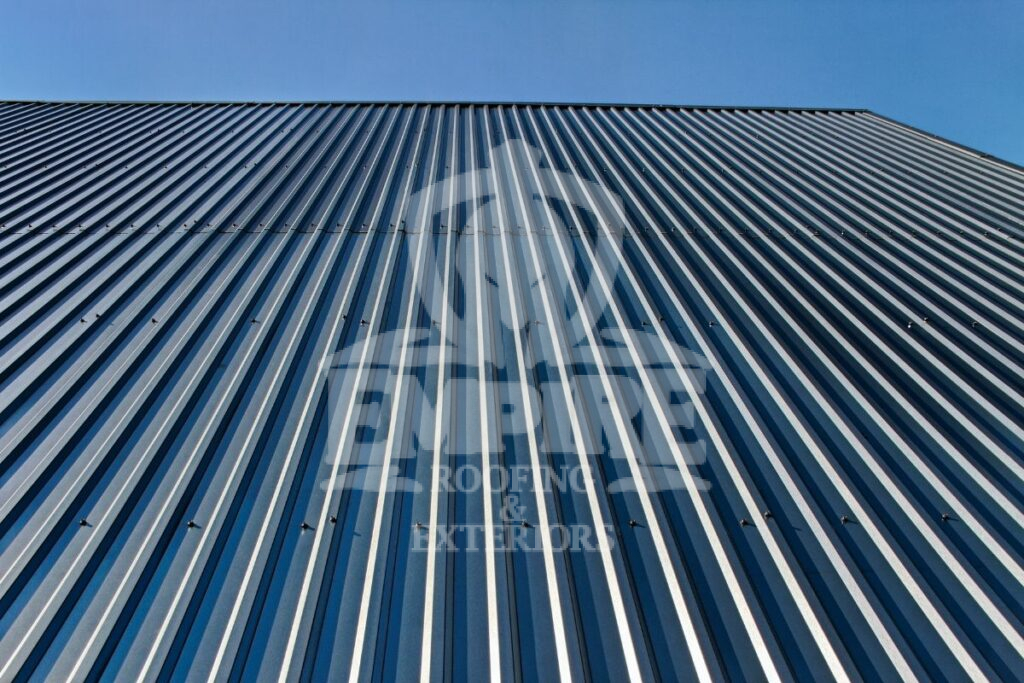
Another strong contender is metal roofs, which continue to be a popular choice for commercial applications due to their durability and long lifespan. Available in materials like steel, aluminum, copper, and zinc, metal roofs are resistant to wind, rain, snow, and hail. Their reflective surfaces help minimize heat absorption, contributing to energy savings. While metal roofs come with a higher initial cost, their minimal maintenance requirements and recyclability make them a worthwhile investment.
| PROS | CONS |
| Weather-resistant: Withstands wind, rain, snow, and hail damage. | Thermal expansion: Can warp if not installed properly. |
| Longevity: Can last 40+ years with proper care. | Noise: Can be noisy during rain or hail storms. |
| Low maintenance: Requires minimal upkeep. | Corrosion risk: May corrode without proper coating. |
#7. Concrete
Concrete is a heavy-duty commercial roofing material that provides excellent fire resistance, making it ideal for buildings in areas prone to extreme weather or fire hazards. Concrete roofs also offer superior insulation properties, keeping indoor temperatures stable in both hot and cold climates. However, their high initial cost and weight require careful planning and structural support during installation.
| PROS | CONS |
| Fire-resistant: Safe for buildings requiring high fire resistance. | Heavy weight: Requires adequate structural support. |
| Insulating: Excellent at regulating building temperature. | Potential cracking: Can crack in extreme temperature changes. |
| Customizable: Can be molded to different architectural styles. | High initial cost: More expensive than traditional roofing materials. |
Bonus: Green Roofing System
Lastly, while not a single material, green roofing systems are eco-friendly commercial options that incorporate vegetation to improve both the aesthetic and value of a building. They feature a few layers, including a waterproof membrane, soil, and a drainage layer. These roofs offer natural insulation, reduce runoff after storms, and enhance biodiversity. However, green roofs require careful planning and ongoing maintenance to ensure the plants remain healthy and the drainage system functions properly.
| PROS | CONS |
| Stormwater management: Absorbs rainwater, reducing flooding risks. | Ongoing maintenance: Requires watering, weeding, and fertilization. |
| Biodiversity: Supports local wildlife and plants. | Leak risks: Drainage failure can cause damage. |
| Air quality: Filters pollutants and improves local air quality. | Limited plant choices: Must be selected based on local climate. |
How to Choose the Right Commercial Roofing Material
When selecting roofing materials for your commercial building, consider these key factors:
1. Building Size and Structure
Larger buildings with flat roofs may benefit from EPDM or TPO, while smaller roofs work better with metal or modified bitumen.
2. Climate
Choose materials that suit your local weather. TPO is great for hot climates due to its reflective surface, while BUR or green roofs offer insulation for colder regions.
3. Building Use
Your business type matters. For example, restaurants may need PVC for its chemical resistance.
4. Maintenance
Some materials need more care than others. Choose one that aligns with your maintenance budget and capabilities.
5. Budget
Factor in both the upfront cost and long-term savings from energy efficiency and durability.
6. Consult with Professionals
A roofing expert can evaluate your building’s needs and recommend the best material.
Install The Best Commercial Roofing Materials With Empire Roofing & Exteriors
With the right commercial roofing material, you can improve your building’s performance and energy efficiency, and reduce maintenance costs. By understanding your options and needs, you can make a smart choice that benefits your business long-term.
Protect your business with strong, quality commercial roofing services from Empire Roofing & Exteriors. We offer reliable commercial roofing services, including metal, TPO, modified bitumen, and more. Our expert team will help you choose the best materials for your needs and budget. Contact us today at (225) 347-8877 and secure your property with a long-lasting roof.
